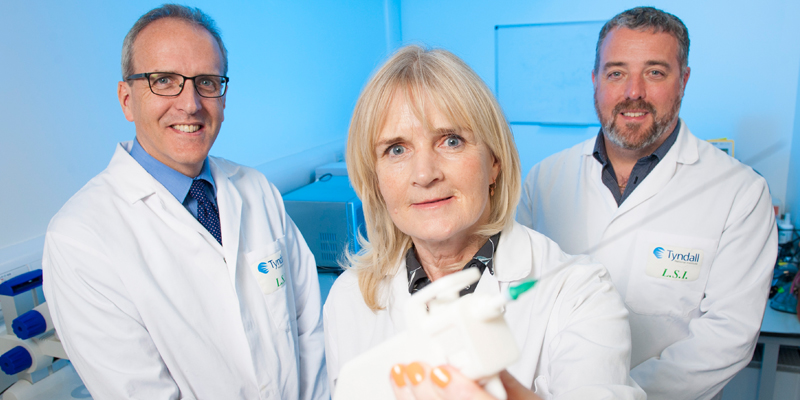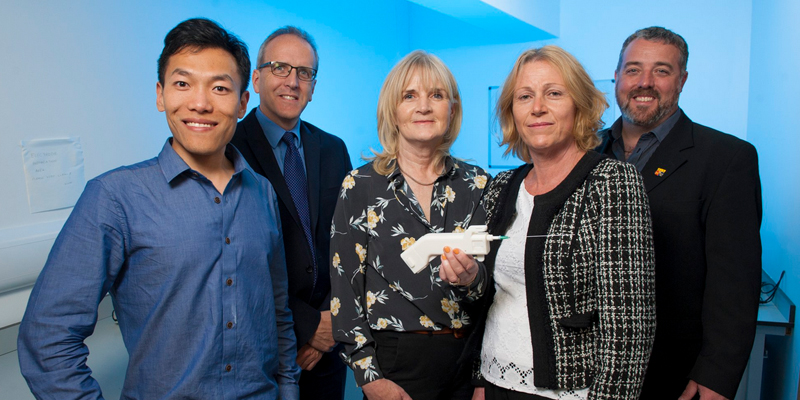In This Section
Research Focus | A Breast Biopsy in an Instant

The SmartProbe needle can give women a cancer all-clear immediately, thus sparing them an anxious wait and reducing a test backlog clogged with benign results.
A biopsy needle originally devised for safer anaesthesia may yet reduce the awful ordeal of waiting days, or even weeks, to find out if you have breast cancer. With patient consent, the SmartProbe is being used to test the excised breast tissue of women in Cork University Hospital (CUH), in BreastCheck and symptomaticpatients. The instantly available results are matching the results that return from biopsies several days later. While a considerable amount of testing remains to be done, and the needle is not yet being used as a diagnostic tool, early indications are that the SmartProbe could revolutionise breast cancer diagnosis. It would significantly reduce the need for biopsies, because of its ability to immediately detect if breasttissue is healthy or not, while also ending the anxious wait for results. A sensor on the core biopsy needle can immediately detect the type of cell present, flagging 'green' for benign, 'yellow' for concern, and 'red' for malignancy.
Dr. Eric Moore, of research centre the Tyndall National Institute and the School of Chemistry, said it has taken "seven or eight years to get to this level, but the results are looking very promising". Dr Moore said their initial focus was on reducing the number of biopsies that women undergo, "and trying to use the technology in a way that you were not removing unnecessary tissue from the breast". However, the focus shifted when they were applying for a Science Foundation Ireland (SFI) award, as the SFI programme included a challenge to spell out the potential societal impact of the new technology.

Liosa O'Sullivan, patient advocate and breast cancer survivor, was drafted in as the societal champion. Ms O'Sullivan, a Cork-based solicitor, was tasked with canvassing patients and the public about the key concern they would like the new technology to address and it crystallised fairly quickly that, "while not having to undergo multiple biopsies is a positive, their overriding concern is the waiting time for results". Dr Moore said. "The psychological impact it has is significant and it is something that has been underestimated."
"For women to be able to get their diagnosis immediately would make a huge difference to their wellbeing, even their confidence in the system. They would know that their analysis was being dealt with there and then, as opposed to being sent to a lab elsewhere." Ms O'Sullivan said that even though 80%-90% of changes on a mammogram are benign, women get intensely anxious and stressed while awaiting results. "And this can happen several times in their lifetime, because the nature of breast disease may be such to cause recurrent issues," she said.
"Many women may repeatedly incur breast biopsies and the harrowing wait for results." Ms O'Sullivan said the number of benign cases "is massive, in terms of blocking the system"; that if women were told the first day that "you are not malignant", it would reduce the quantity of tissue samples sent to laboratories and the number of benign cases taking up time at multidisciplinary meetings, as well as the number of women attending outpatient appointments.
If the SmartProbe reaches its potential, instead of a woman having tissue removed from different parts of the breast, only the malignant tissue would have to be removed, because the sensor on the needle would detect it. Martin O'Sullivan, lead surgeon at BreastCheck Southern Unit and University College Cork, said hebelieves the SmartProbe has the potential to make a huge difference to the treatment of breast cancer patients.
"There are two big potential benefits," he said. "One is that, in the breast clinics, at the moment, the majority of patients, 80%-90%, have benign disease, so it might be possible to save maybe 80% of patients undergoing a breast biopsy with this technology. "Also, it could greatly reduce the number of breast biopsies that are performed, which would have a lot of positive knock-on effects, in terms of the workload for the pathology lab, the workload that goes into the multidisciplinary team, and so on. "And then, for the cancer patients, if you can tell, more or less straight away, that they have a cancer, then you can fast-track them for treatment."
The technology may also reduce the need to bring patients back to theatre for a second operation, if there is concern around clear margins: i.e. whether the tissue around the cancer is normal, Mr O'Sullivan said. It won’t be long until the SmartProbe is widely available to all practitioners. "In the next five years, if everything goes according to plan," said Dr Moore.
That plan includes getting the go-ahead for three years of clinical testing across multiple hospital sites, involving thousands of patients, where the SmartProbe would be used to perform the biopsies, rather than on excised tissue, as is currently the case. Then, there are the various regulatory hoops that manufacturers of the SmartProbe would have to jump through, and indeed a decision be made as to who that manufacturer will be. All of this requires time and money, which is where SFI comes in.
As Dr Moore points out, the idea of SFI funding is to "accelerate research towards commercialisation", and the SmartProbe project has already secured €220,000, as one of six teams shortlisted for the SFI Future Innovators award. There’s a bigger pot at stake. If SmartProbe wins the overall award, which is due to be announced in December, Project SmartProbe would then receive a further €1m. Dr Moore is extremely hopeful. "We have a very strong story, we have a very strong technology, and we have very strong engagement from the societal impact side of it, so all the key elements are there," he says. "Indeed, by the time we finish this project, we should have everything in place to take us to the next phase and the next phase is going into clinical trial."
This article was written by Health Correspondent Catherine Shanahan and appeared in the Irish Examiner on July 22nd, 2019.
School of Chemistry
Scoil na Ceimic
Contact us
Second Floor, Kane Building, University College Cork, T12 YN60
